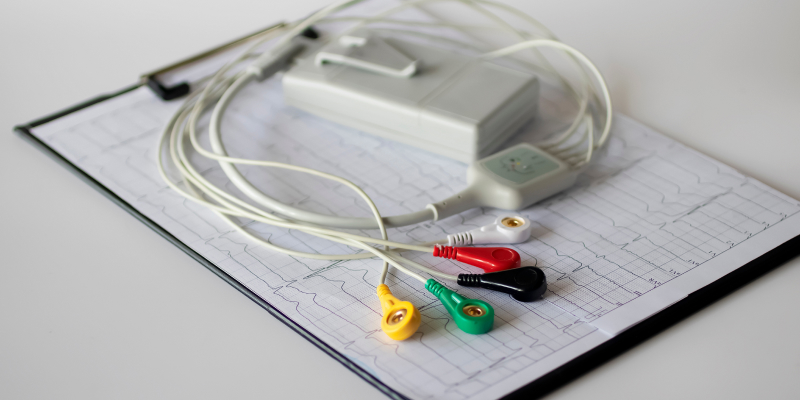A Holter Monitor is a cell phone-sized ECG (electrocardiogram) recording device. It operates on a battery and is attached to the patient’s body using an electrode and cable to record their heart rhythm and heartbeat for 24 hours or more.
The Holter Monitor device, also called Ambulatory Electrocardiography, is predominantly recommended by doctors when:
- Standard diagnostic tests like EKG/ECG fail to provide adequate information about your heart’s condition.
- You experience arrhythmia (irregular heartbeat). Holter Monitor helps in this case because some arrhythmias are undetectable with an electrocardiogram.
- You experience a slow or low heartbeat.
- You have unexplained on & off palpitation[rapid heartbeats]
- You have a cardiac condition that increases the risk of arrhythmias.
- You experience Syncope or unexplained fainting.
Holter Monitor: How Does it Work & What Does it Diagnose?
Like an ECG machine, the Holter monitor records your heart's rate and rhythm. It is also used similarly to the standard EKG or ECG. The device comes with electronic leads or wires and electrodes or sensors. These sensors are attached to your chest and abdomen and connected to an ECG machine to measure your heart’s activity.
The Holter monitor is safe to use and does not require electricity to record your heartbeat. It works silently, monitoring your heart’s electrical activity as you perform your routine work. The recorded heart activity can also be recorded and printed for further use.
What does the Holter monitor diagnose?
Using the Holter monitor, your doctor will:
- Analyze your symptoms that do not show up during a resting ECG or stress test.
- Identify the root cause of your dizziness, syncope/fainting, and palpitations.
- Determine the effectiveness of any medications prescribed for your existing cardiac problems.
- Evaluate the level of heart disease and palpitation risk.
- Diagnose issues like atrial fibrillation, atrial flutter, multifocal atrial tachycardia, ventricular tachycardia, paroxysmal supraventricular tachycardia, ectopic/missed beats, and bradycardia.
- Assess if irregular or slow heartbeats are causing fainting occurrences.
Holter Monitoring Test Preparation Tips
The Holter monitor test is a simple procedure requiring no special preparation. You can go about your daily routine and have your regular meals. In short, being as normal as possible will help give accurate results.
You must bathe or shower before your appointment for a Holter monitor placement. The monitor must stay on continuously for 1-2 days until the recording is complete, so it's important to be clean and comfortable before the procedure.
A clinical assistant will shave your chest area where the electrodes are placed. The electrodes have wires connected to the Holter monitor, which is no bigger than a pack of cards.
Your doctor will guide you through the process of wearing a Holter monitor and provide you with instructions. Following the procedure, you can resume your daily routine as usual.
What to Expect During a Holter Monitor Test
The Holter monitor test is a simple, painless, and non-invasive procedure. Before the process, you should:
- Remove any jewelry that may interfere with the procedure or impact the readings.
- Remove your top clothing to allow the technologist to attach the electrodes to your chest.
- Permit the clinical assistant to shave and clean the area where the electrodes will be placed. This will ensure that the electrodes stick firmly on your skin.
During the procedure, your doctor will attach the electrodes to your chest and abdomen. The electrodes are connected to the Holter monitor, which you can wear over your shoulder or around your waist. You can keep it in your pocket or clip it to your belt.
Here are some pointers to keep in mind:
- Make sure to check if the monitor's batteries need to be changed. Learn how to replace them and keep extra batteries handy, just in case.
- Inform your doctor of any symptoms, such as dizziness, light-headedness, palpitation, chest pain, or shortness of breath.
What to Expect After a Holter Monitor Test
There is no specific post-procedural care for a Holter monitor test. However, you should inform your doctor if you experience any unpleasant symptoms. After the duration, your doctor will remove the device and evaluate the recordings. Based on these results, they will recommend the right course of treatment to alleviate your symptoms, modify your existing medication, or undergo additional diagnostic tests.
What are the risks of wearing a Holter monitor?
Generally, there are no risks associated with the Holter monitor other than some minor discomfort or irritation in the area where the sensors are placed. Holter monitors are usually not affected by other electronic devices. However, some appliances may disrupt the signal from the electrodes to the Holter monitor.
While wearing the monitor, you should not:
- Engage in water-related activities like swimming or bathing since water can damage the device. If the monitor is wireless, you should learn how to disconnect and reconnect the sensors to take a shower,
- Engage in activities that cause excess sweating, which can cause the leads to detach and disrupt the recording process.
- Use electric blankets, magnets, metal detectors, electric razors, electric toothbrushes, etc.
- Go near microwave ovens and high-voltage electrical wires.
Cell phones should also be kept at least 6 inches away from the Holter monitor to prevent signal interference with the Holter monitor.
Conclusion
Holter monitoring is a form of long-duration ECG testing that can uninterruptedly record the heart’s activity for 24 to 48 hours. With this test, your doctor can accurately diagnose how your routine activities impact your heart rhythms.
It is essential to seek medical advice if you experience any uneasy symptoms. Dr. Karthigesan is a leading Interventional Cardiologist in Chennai who can diagnose and help you manage your cardiac issues. He will also recommend the right course of treatment based on your diagnostic test results. Kindly reach out to our team to book your appointment with Dr. Karthigesan.

